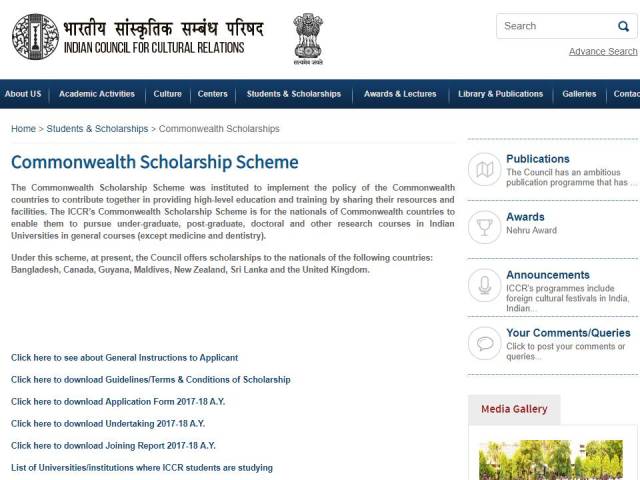 Indian Council for Cultural Relations Commonwealth Scholarships website.
Indian Council for Cultural Relations Commonwealth Scholarships website.
[These excerpts are from an article appearing in the current edition of The Round Table: The Commonwealth Journal of International Affairs. It is a special edition focusing on Educational co-operation in the Commonwealth.]
India’s Aid and Soft Power Resources
Arguably, the items discussed thus far, including long-term scholarships, short-term training awards, and many forms of India-Africa institutional development, are all part of India’s brand of development assistance. But beyond these, India has also developed institutions of cultural diplomacy in its Indian Cultural Centres. Through the ICCR there are 36 cultural centres world-wide, but just four African countries are included in the list (Egypt, South Africa, Tanzania and Mauritius), with three being Commonwealth. Even if Cultural Centres are not widespread in Africa, Indian films remain hugely popular and influential across the continent, and there is even an [Indian Technical and Economic Cooperation] ITEC course on Indian film.
Such Centres are not perceived to be primarily for the promotion of Indian languages in the manner of China’s promoting Mandarin via its 500 Confucius Institutes world-wide. Rather, India encourages its languages via its university Chairs of Indian Studies. There are 74 such Chairs of Indian Studies, and almost half of these focus on the promotion of Hindi or Sanskrit. Just seven countries in Africa are represented in this community (three Commonwealth): Mauritius, Kenya, Tanzania, as well as Morocco, Sudan, Ethiopia, and Egypt. It can be readily seen, therefore, that only three countries in the whole of Africa have both an Indian Cultural Centre and an Indian Studies’ Chair: Egypt, Mauritius and Tanzania (Indian Council for Cultural Relations (ICCR) (2017) Annual Report: April 2016–March 2017. Two of these have substantial Indian diasporas and are also Commonwealth. Although several of India’s major aid recipients have large diasporas, such as Bhutan and Nepal, others such as Afghanistan, Egypt and Ethiopia have relatively small Indian populations.
The promotion of India, whether in formal soft power terms or in the effective implementation of development aid commitments, is difficult in the absence of representation. Within Africa alone, it is a further illustration of India’s expanding diplomatic footprint that the number of high-level visits has risen dramatically over recent years. Equally significant has been its decision to open 18 new Indian Missions in Africa over the four-year period (2018–2021). This will raise the number of Resident Indian Missions in Africa from 29 to 47.
There is, however, something of a tension running through this article, and it concerns the classification of students and countries in terms of their being Commonwealth or not. But, as mentioned above, that categorisation does not necessarily occur to the international student, professional awardee or policy maker. More than this, the term may actively be avoided. In the case of one student from Uganda currently studying in India, he finds it hard even to write ‘Commonwealth countries’: ‘I hardly use the phrase. First because the organisation seems very distant from the ordinary Ugandan, if it even exists in their mind. Furthermore, I think “Commonwealth countries” is a very “nice” way of covering the sometimes brutal colonial history. What many young Africans aspire for are honest conversations especially in regard to our past’ (Ugandan student to author, 27 April 2019). On the other hand, it has been noted earlier that a Rwandan student talked of it being ‘a privilege to be in India, a Commonwealth country’.
Equally, however, there could be valuable testimonies from some of the other 273 Ugandans who gained Commonwealth Scholarships over the period 2015–2017. Indeed, at this 60th year since the start of the scheme after Oxford 1959, it would be an appropriate moment to repeat the valuable Commonwealth Scholarship Commission evaluation of thousands of scholars in 2009, and perhaps look particularly at the experiences of Indian, Rwandan, Ugandan and South African participants in the scheme. Much more needs to be known about how students and professionals involved in different types of South-South Cooperation such as those described here may also appreciate the shared values, language and histories associated with the Commonwealth.
Nehru’s own comment on student mobility, taken from his opening address to the second Commonwealth Education Conference of 1962 in New Delhi, remains relevant to our focus on HRD and mobility throughout this paper: ‘Wherever you go, at the back of it, must lie education’.
Kenneth King and Pravina King are with the School of Education, University of Edinburgh.



